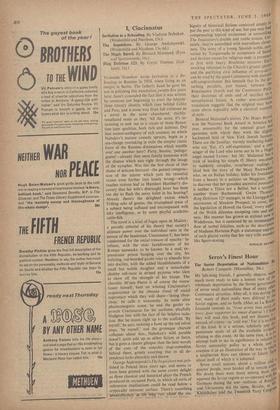I, Cincinnatus
Invitation to a Beheading. By Vladimir Nabokov. (Weidenfeld and Nicolson, 15s.) VLADIMIR NABOKOV wrote Invitation to a Be- heading in Russian in 1934, when living as an emigre in Berlin. The fatherly hand he gave his son in polishing this translation, twenty-five years later, hasn't concealed the fact that it was written by someone just beginning to erect the labyrin- thine literary identity which rises behind Lolita and Pnin, and is some way from full existence as a novel in the same chambered, thickly- tessellated sense as they. All the same, it's in- teresting to seek out in it traces of those Byzan- tine later qualities, both rich and dubious. Did that master-ambiguity of sick cosiness, on which Nabokov's mature comedy sprouts, begin as a sea-change overtaking in exile the simpler comic force of the Russian diminutives which tumble over one another here? Fatty, beastie, `pedago- guette'—already they seem faintly luminous with the disease which eats right through the image of the nymphet. Was this the first shoot of that theme of delicate betrayal—the genteel compunc- tion of the injurer which puts his resentful victim even further into lonely wrong—which reaches riotous leaf in Humbert Humbert's dis- covery that his wife's distraught lover has been too shy to flush the noisy toilet in his hearing? Already there's the delighted excess which Trilling asks of genius; the triumphant sense of a subject being suffused and encompassed with inky intelligence, as by some playful academic cuttle-fish.
The novel is a kind of fugue upon de Maistre: a parodic rebuttal of his theory that society's ultimate power over the individual rests in the person of the headsman. Cincinnatus C. has been condemned for the social treason of opacity : he refuses, with the stoic fastidiousness of his Roman namesake, to be known. In a mad, ex- pressionist prison hanging over the city, his waltzing, red-bearded gaoler tries to wheedle him into docility, with the added blandishments of a small but nubile daughter and a remarkable chubby cell-mate in striped pyjamas who likes to show off the strength of his biceps. The cherubic M'sieu Pierre is of course the execu- tioner himself, bent on winning Cincinnatus's acquiescence in the obscene ritual of social supremacy which they will share—'doing chop- chop,' he calls it winsomely. In scene after phantasmagoric scene, he and the gaoler re- proach Cincinnatus for his surliness, playfully bludgeon him with the fact of his helpless isola- tion. But he resists right up to the scaffold. 'By myself,' he says, resisting a hand up the red velvet steps, `by myself,' and the grotesque charade collapses about him., Nabokov's wild parable doesn't quite add up as either fiction or farce, but it gives a clearer glimpse than the later novels of the core of the anarchic tragi-comedian behind them, grimly asserting that in all de- pendence lurks absurdity and shame.
George Andrzeyevski's The inquisitors was pub- lished in Poland three years ago, and seems to have been greeted with the same covert delight as those classical and historical plays the French produced'in occupied Paris, in which all sorts of subversive implications could be read below s cryptically innocent surface. "I here's something unsatisfatteryY in "the long ron. about the am- m- biguity of historical fictions contrived simply to, put the past to this kind of use, but you may find compensating topical excitement in unravelling The Inquisitors's double and treble ironies. Cer- tainly, they're assembled with marvellous clever' ness. The story of a young Spanish noble, con' verted by Torquemada to acceptance of brutal and devious means for religious ends, is presented at first with heavy Brechtian sarcasm. Each mocking reference to the Church's greater glorie'', and the purifying civic influence of autos-dd.-le can be read by the good Communist with pleasant self-congratulation. But beneath that lie the clis' turbing parallels, just hinted, between the Renaissance church and the Communist Par* their doctrines of ends and of sacrifice to a, metaphysical future. A rather non-committal translation suggests that the original may have risen above topicality with a classical austerity of style. Bernard Malamud's stories. The Magic Barrel, won the National Book Award in America last year, presumably for the unusual grace and spareness, with which they work the slightly hackneyed field of New York Jewish humour. There.are the familiar, warmly mothering ladies who say 'Eat, it's self-expression,' and a Ines' senger of the Lord who turns out to be a Negro angel named Levine: but Mr. Malamud has 3 trick of leading his simple 0. Henry anecdotes to suddenly complex, reverberant endings. I liked best the story of the Macy floorwalker' who, on an Italian holiday, hides his Jewishness from a beauty in a palazzo on Maggiore, only to discover that her proudest ancestral possession, is neither a Titian nor a Bellini, but a tattooeo number from Buchenwald. Gwyn Thornas'5 Ring Delirium 123 manages, in the Llaregguh'ir microcosm of Meadow Prospect, to cover, ih'e, the legislation of. Howell the Good, 'every aspect of the Welsh dilemma excepting rain and sad' ness.' His manner has grown as stylised now 3: Wodehouse, but is sustained by an inconseclue", flow of verbal felicities, such as the descripti°' of Madame Hortense Pugh, a statuesque soprane, of such glacial vanity that her very trills sounded like figure-skating. RONALD RRY0E14


































 Previous page
Previous page